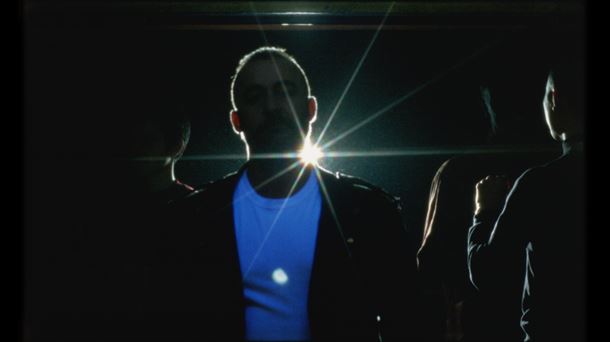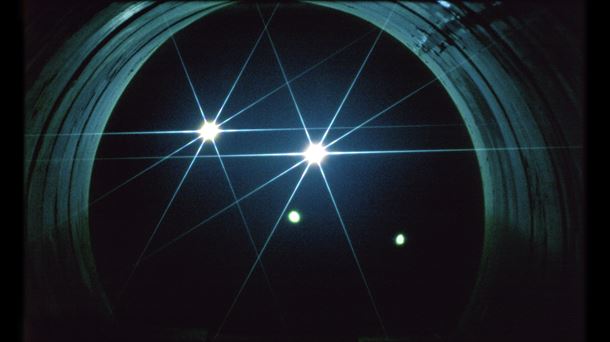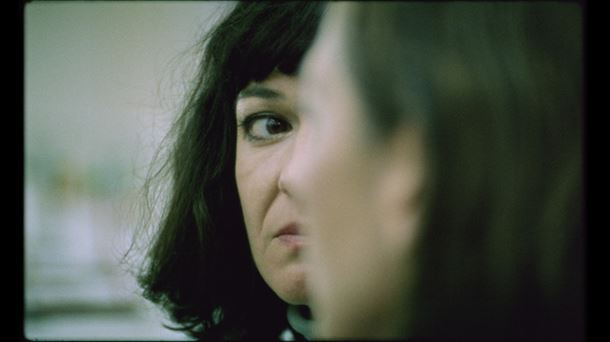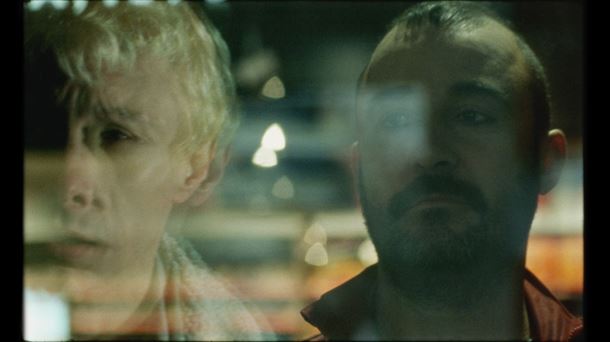Ion de Sosa: “‘Mamántula’ has humor, but it is not a joke”
Basque language irakurri: Ion de Sosa: “‘Mamántula’k umorea dauka, baina ez da txistea”
The city is disturbed by a series of murders, and a couple of police officers investigate cases in which a series of men have been found dead and their bodies emptied by the thirst for the blood and semen of Mamantula, a giant tarantula disguised as a human.
That is the starting point of Mamantulaa medium-length film by Ion de Sosa (San Sebastián, 1981) that premieres in the Zabaltegi-Tabakalera section of Zinemaldia, the most open competitive section of the festival, where there are no rules or limitations of style or time.
There is no doubt that it is the right place for a different thriller that De Sosa himself defines as “a nice mix between an episode of X-Files, blue velvet and Rex, a different policeman“.
You return to the Zinemaldia of your city, this time with Mamantula. How do you expect to live the Zinemaldia experience?
I’m very happy. The selection in Zabaltegi is something very good. Being part of an international, competitive and diverse selection where films outside the norm are shown and where duration is not taken into account is an excellent start. A framework that will bring us positive things in terms of visibility, further projections, contact with the public, sales and press.
A large part of the financial, technical and artistic team of the film will be able to attend the premiere, and that makes me immensely happy because we will be able to enjoy together after so much work.
You have lived inside, with golden legend and Androids dream, both the Berlinale and the San Sebastian Zinemaldia. What particularities does the San Sebastián Festival have, from your perspective? What traits do you think define his personality?
The particularities and personality of a festival are defined by its programmers, its artistic directors. Just as people change, so do festivals with the selection of each edition.
Sometimes it happens that the criteria of the programmers of a certain festival go hand in hand with your artistic proposal, and that coincidence, that synergy, allows you to confront your film with the public, which is what we make films for.
I really enjoy attending festivals as a guest, be it Berlin, Donostia, the Cannes Festival where we have gone to accompany Irati Gorostidi this spring with Accountants…
Evaluating a certain festival is very subjective, it counts a lot how you feel inside, at what vital moment it catches you. Berlinale was very important for me in 2015 because it was a self-imposed goal at the time I emigrated to Germany to develop as a person and as a filmmaker. It was a confirmation that I had not wasted time searching for my own voice, and I experienced it with great enthusiasm.
This edition of Zinemaldia is equally significant because it is the culmination of five years of intense work with Leire Apellaniz. We have two pieces from our production company in the competitive section. This circumstance makes us feel accompanied, and that is very valuable on the sometimes lonely path of less conventional cinema; especially when we have more risky projects ahead that we are going to produce.

‘Mamantula’
What was the filming process like? Mamantula?
It was one of the most fulfilling and pleasant cinematographic experiences of my life. Paola Álvarez, the producer from Berlin, arranged, with great effort and blind faith, that we would have everything we needed to shoot the film. A priori, nothing in the text was ruled out because we believed it would be too difficult or because we didn’t want to get into trouble.
I felt very well accompanied at all times. Carmen Main, the production designer, Jorge Castrillo, the director of photography, and, in general, the entire technical and artistic team were very generous in their effort and in taking aesthetic and formal risks.

‘Mamantula’
The film moves between the noir genre and science fiction. How have you handled the conventions of each of the genres, even to break them?
For me, the film is a nice mix between an episode of X-Files, blue velvet and Rex, a different policeman. It has something televisual and something poetic, and both languages coexist. The film is aesthetically an adolescent dream, a thriller that contains crime, a particular form, sensuality and humor.
We were clear about our main references: Shiver, Possession, Cruising, Under the skin, Hiroshima, mon amour and the photo book The ballad of sexual dependency by Nan Goldin, which we always carried in our camera suitcase to inspire us in moments of confusion.
The designs of the lifeless bodies that Mamantula leaves behind are inspired by works by Francis Bacon and Anish Kapoor. Deformed, infected, swollen and deflated bodies, and composed of textures rich in nuances to achieve a lot of disgust with something very beautiful.
It is a simple film that achieves a delicate harmony between elements of disparate origins.
What has been the process of building and giving mystery and personality to the characters of Mamántula and the main investigator, played by Lorena Iglesias?
Broadly speaking, Mamantula is Scarlett Johansson’s alien character in Under the skin dressed like Schwarzenegger in Terminator 2. Both characters share with Mamantula that they come from another plane, another planet or another time, and that they are among us as something anthropomorphic but totally alien to humans, and both become sensitive to our species as they spend time with us. They love us.
Moisés Richart has that magnetic presence that gives character to the character just with how he moves and how he looks. I love working with him.
Lorena is Dana Scully, Clarice Starling and Agent Dale Cooper from Twin Peaks: intuitive, obsessive, intelligent, temperate… The best of her promotion. She is a cliché character, but Lorena’s interpretation makes her particular, chaotic, with a past that she barely reveals but it seems that she comes back from everything… She reminds me of Peter Falk in Colombo.
The entire cast is wonderful in a way that was not easy at all. During filming I never tired of repeating to the actors: “The film has humor, but it’s not a joke.”

‘Mamantula’
You also work, as director of photography, on another film in the Zabaltegi-Tabakalera section, such as the short film Accountants, by Irati Gorostidi, a radically different film. How has your work been on this film to give it that seventies and industrial atmosphere that it exudes?
Irati and I are friends. We were introduced to Maider Fernández on her birthday in 2018, and Irati called me one day to work with her on her previous short film, Unicorn.
The work in Accountants It has been very nutritious. It is based on the experiences of Irati’s parents and people close to them in a specific context: Euskadi, at the end of the 1970s. Irati focuses on a certain group of people who want to live differently, looking for a different spirituality and a new way of relating to each other and to society.
We had many conversations about the film device that would support all the layers (formal, political, theoretical, narrative) that make up the film. How to represent the era, how to film the assembly in the factory, how to give the film its own personality… We opened up unknowns whose answers we narrowed down with references that we liked, that fell within our aspirations and our possibilities.
Personally it was also incredible because, in addition to Irati, Leire and Carmen Main, who was also the art director of the short, it gave me the opportunity to work with people I admire, like Maddi Barber, Ainara Elgoibar and Usue Arrieta , who co-produced the short film and who provided very interesting visions.

‘Mamantula’
Are you working on any other project that you can tell us something about?
Of course. At Apellaniz and de Sosa we are working on two projects that we believe can become two good films: Balearic (working title), which is scheduled to principally shoot in spring 2024 and which I will direct myself, and Anekumenby Irati Gorostidi, which is in the financing phase.
Balearic It is a choral, summery film with elements of horror that talks about a gradual metamorphosis that happens to us in capitalist society: when you are eighteen years old you want to change the world and from the age of forty what you want is a swimming pool.
Source: Eitb
Bruce is a talented author and journalist with a passion for entertainment . He currently works as a writer at the 247 News Agency, where he has established himself as a respected voice in the industry.












